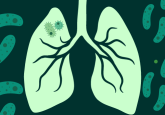Developing immunodiagnostics to tackle antimicrobial resistance

Refer a colleague
 Vaishali Verma (left) is an Assistant Professor in the Department of Biotechnology at Bennett University (Uttar Pradesh, India) who develops immunochemical reagents for the diagnosis of drug-resistant bacteria. In this interview for our Spotlight on antibody discovery, we talk to Vaishali about the role that antibody discovery plays in her research, the techniques she uses and how her work contributes to the fight against antimicrobial resistance.
Vaishali Verma (left) is an Assistant Professor in the Department of Biotechnology at Bennett University (Uttar Pradesh, India) who develops immunochemical reagents for the diagnosis of drug-resistant bacteria. In this interview for our Spotlight on antibody discovery, we talk to Vaishali about the role that antibody discovery plays in her research, the techniques she uses and how her work contributes to the fight against antimicrobial resistance.
Could you please introduce yourself and give us an overview of your research?
My primary research expertise lies in the field of antibody discovery and engineering using surface display technology, primarily phage display. With funding from the Science and Engineering Research Board (Department of Science and Technology, Government of India), I am currently working on producing recombinant mouse antibodies that would be used for developing immunodiagnostics to profile carbapenem resistance in drug-resistant bacteria. My goal is to contribute to the development of simple and effective diagnostic tools for the detection and management of drug-resistant bacteria, which pose a significant public health concern.
What techniques do you use for antibody discovery?
To discover antibodies, we employ the surface display technology called phage display. This technique involves the expression of a library of antibody fragments (scFv) derived from mice immunized with the target antigen on the surface of bacteriophages (viruses that infect bacteria). Subsequently, through a process called biopanning, the libraries are screened against specific target antigens to isolate high-affinity antibody fragments. The selected clones are further screened for specificity using ELISA, Western blot, etc. After isolating specific antibodies, we reformat them into full-length antibodies and express them in mammalian expression systems, for large-scale production of antibodies.
What challenges do you face in this research?
If the conditions for selection are not optimized, the resulting clones may lack specificity. To mitigate this issue, we design and optimize selection strategies based on the properties of the target antigen to reduce false positives during the selection process. Additionally, a key challenge in antibody production is the associated costs. To address this, we are actively working on optimizing our expression vectors and conditions for expression to improve the efficiency and cost-effectiveness of the production process.
How could your research contribute to the fight against antimicrobial resistance?
The global emergence of carbapenem resistance in bacteria is a significant concern, and the slow pace of antibiotic discovery has resulted in limited treatment options. Therefore, our primary objective is to develop reliable, and user-friendly point-of-care diagnostic reagents to facilitate timely patient treatment and enhance clinical outcomes. By ensuring the controlled use of carbapenem drugs and effectively managing the spread of infection by quick screening, we believe that we can help address this critical issue and reduce its impact.
What’s next for your research?
Our objective is to leverage our optimized antibody discovery technology to not just create effective diagnostic tools but also work towards the development of antibody-based therapeutic interventions to combat drug-resistant bacterial infections.
Is there anything else you’d like to add?
Amid the COVID-19 pandemic, scientists worldwide collaborated to rapidly develop vaccines to mitigate its impact. Similarly, antimicrobial resistance poses a significant concern, and it is my sincere hope that the global scientific community will continue to work collaboratively and take proactive steps to address this issue. As an antibody engineer, I am committed to contributing my best efforts towards combating this issue.
Please enter your username and password below, if you are not yet a member of BioTechniques remember you can register for free.





